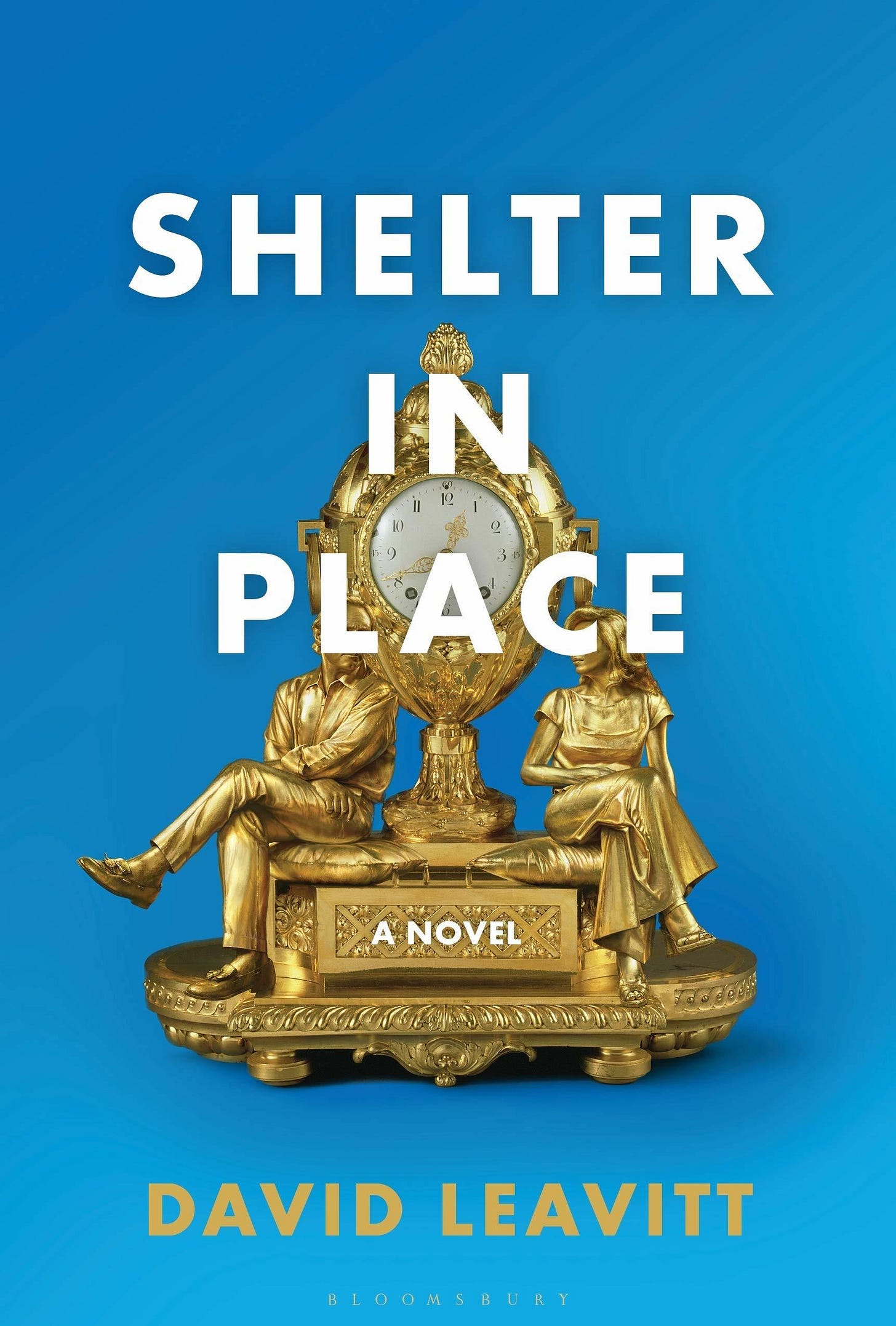How fortunate that fiction allows us to attend parties that in life—that is, in our old lives—we probably would have avoided. Proust serves up the gossipy details while sparing us the misery of actually being present at Madame Verdurin’s evenings. No sensible person would brave the thrillingly ghastly dinner in Thomas Bernhard’s Woodcutters, and we’re quite content to let Joyce’s Gabriel Conroy take our place at his aunts’ annual Christmas dance. The novel of manners gives us a look into milieux that we may prefer to observe from afar.
I thought of this often while reading David Leavitt’s sharply etched, funny and enjoyable novel, Shelter in Place, which features many highly animated, strained gatherings at which, we may feel, we would be even more uncomfortable than the fictive guests. The first of these is a lunch at the Connecticut weekend estate of Bruce Lindquist, a successful “wealth management adviser,” and his wife Eva. It’s November, 2016, and Donald Trump has just been elected president. None of the party goers (old friends, hangers-on, and employees) is happy about the election results. But Eva, whose family left Poland to escape the Nazis, is so upset that she jokes about assassinating the new president and decides that the only way to survive the Trump regime is to buy an apartment in a palazzo in Venice. She also wants to flee her Park Avenue neighbors, who voted for Trump and thus, to Eva, have revealed their demonic natures.
Eva’s decision to move to Italy preoccupies her charmed circle as much as (or perhaps more than) the new political reality. Each character’s response to Eva’s costly exit plan grows out of, and reveals, an inner life rich with memory and experience, a psyche troubled by worry about jobs, money, loneliness, love, and death. Meanwhile—in rambling Upper West Side apartments, at upscale Indian restaurants in Manhattan, and the bookstores of gentrified Brooklyn they’re all talking nonstop: brittle, mindless chatter, reckless in its banality. Shelter in Place catches in motion a certain sort of simultaneously impassioned and snooze-inducing conversation: political speculation, literary gossip, mock-debates over nothing. Eva’s friends play Candy Crush, enthuse over Rachel Maddow, argue about the work of Lydia Davis and Salman Rushdie.
Tell a friend about Book Post
Subscribe, Receive free updates, Befriend, Follow
Help build a connected world through reading
Everyone thinks a great deal about home, or the lack of it. Two of the central figures are interior decorators, and, throughout, close attention is paid to what we see when we enter a room, to what esthetic choices reveal about the person who has made them, and what constitutes good and bad taste. As the novel progresses, homes become the site of deep anxieties about whether to risk change or hold on what one has. The book’s most unfortunate characters are the attractive young gay guys, socially presentable, reasonably good cooks, who make the mistake of imagining they are Eva’s friends (rather than her retainers) and fall out of favor, into permanent exile from the charmed domestic circle, and—in one especially sad case—homelessness.
Nearly everyone we meet in these pages is more complex—better—than the exterior they show the world. The exception is Eva, whose behavior is so appalling—her treatment of her Honduran housekeeper is especially repellent—that she effectively puts herself beyond redemption, and it’s a blessing for everyone when she departs for Venice. Little by little, each of the other characters reveals a soul beneath the tough outer shell. Eva’s old friend Min, an editor whose career has led her through the offices of all the late twentieth century’s major print publications, is trying to keep her job at a shelter magazine—and keep her head above water. Bruce’s unsettling discovery of the depths of his own compassion inspires him to question the habits into which he has passively slipped. Jake, the decorator whom Eva pursues to redo her Venice apartment, confronts the painful sources of his hesitation to take the job.
The novel delights in catching people in the act of being their predictable tedious selves, but Leavitt delves beneath these surface social constructs. Those glimpses of depth and grief, combined with the mood of the moment when I read the novel—late summer, pandemic—made me feel a tenderness for these hapless, all-too-familiar creatures, gathering for their fraught social occasions, never suspecting how fragile it is, how much their world is going to change.
Francine Prose is the author of twenty-one works of fiction, most recently Mister Monkey. Her latest book is the volume of essays What to Read and Why.
Book notes
This week saw the close of the first-ever virtual version of the annual international publishing schmooze-fest, the Frankfurt Book Fair. (As I should not be noting more than once, longtime editor Jonathan Galassi offered a hilarious parody of its social machinations in his novel Muse, reviewed a few years ago by yours truly.)
Bolstered by buckets of German government euros, the virtual fair provided a window on what can and can’t be accomplished in the way of making book (cultural, professional) life virtual. The biggest benefit, as we are seeing now in so many realms of existence, is the expansion of access. 1.5 million people, rather than a couple of hundred residents and tourists in Frankfurt, were able to attend the fair’s public-facing events with Ibram X. Kendi (7:43), Margaret Atwood (10:47) , Slavoj Žižek (7:43), Alicia Garza (8:19), Eliot Weinberger (11:36), and other writers from around the world. The networking benefits were opened to publishers and agents without large travel budgets, as evidenced in a burst in participation in the fair’s virtual “B2B” programs. They provided a digital “matchmaking tool” for one-on-one encounters and an e-version of the hotel bar, with live music, meditation, chair yoga, and fireside chats with industry professionals. Although fair’s surely exhausted director “particularly enjoyed the meditation sessions, which really helped me,” he concluded that “the physical book fair cannot be replaced. The face-to-face interactions and networking are central to the experience of the fair.”
Virtual life is illuminating a central tension between in our lives between equity and interaction: An entrenched institution like the Frankfurt Book Fair loses some of its intimacy and human connection in our new more digital landscape at the same time it becomes open to people outside a closed professional circle with ample expense budgets. Similarly virtual work makes it possible for potential publishers to work outside the high-rent cities that have limited access to a career in publishing at the same time it makes it harder to build fruitful relationships and share ideas. Gathering virtually not only makes our institutions less exclusive, it also mitigates their carbon impacts. But how to keep our human selves nourished? We talk about Zoom fatigue, but maybe the problem is more what Zoom is taking the place of.
Anyway, the festival did offer a satellite’s eye view of the impact of the pandemic on the reading life, which as we have seen has been not as catastrophic as feared. Andre Breedt, managing director of Nielsen Book, which tracks book sales in a dozen countries, confirmed that in the spring, “for some weeks, virtually no books were sold,” but, as Publishers Weekly reported, there were “speakers all over the world emphasizing that the book business, while beleaguered, has proven surprisingly resilient and, contrary to cliché and accusations of being mired in the past, adaptable to the new conditions of bookselling and publishing.” Among the statistics, people in the UK are reading 2.7 more hours a week, though not necessarily new books.
Those watching how we read around the world saw deeper problems, though. Simon & Schuster’s Jonathan Karp told participants, “There is tremendous polarization and lack of faith in our institutions right now. Questions of how we rebuild these institutions will be at the center of the conversation for years to come.” And Sophie de Closets of the French publishing giant Fayard said “books don’t have the power or word of mouth that they used to. Sales have been polarized: there are some huge bestsellers and many books going out unnoticed. Also, global curiosity has narrowed, and readers don’t want to take a risk. Now readers confine themselves to only what they believe, and they are polarized. My question is how we as publishers can maintain good global conversation. How can we strengthen democracy?” Good question.
Meanwhile, back on our actual continent, Minneapolis’s Moon Palace Books, which we covered in our Notebook on Minneapolis bookstores’ responses to the George Floyd protests in May, received the Midwest Bookseller of the Year award from the Midwest Independent Booksellers Association. The Association’s statement called Moon Palace “radically welcoming, with a generosity of spirit that radiates throughout the community and the book industry at large.” Founders Angela and Jaime Schwesnedl envisioned their store as a place that “has stuff going on in it beyond being a bookstore from dawn to dusk,” and with programs like books for prisoners, free meals for homeless people during the pandemic, and providing space for a local farmer’s market, its role in the community has gone beyond the usual readings and book clubs, though it has those too, and some unusual ones. In the dead center of May protests, they expressed solidarity with the protesters, passed out pizzas from their cafe to those in the streets, and asked those wanting to pay to send the money to the family of George Floyd instead. Their store stood unharmed amidst the turmoil, but Jamie posted nevertheless to social media, “Things that may be lost or damaged in our building are just things, but your life is priceless, just like George Floyd’s life was priceless. Be safe.”
Book Post is a by-subscription book review service, bringing book reviews by distinguished and engaging writers direct to your in-box. Subscribe to our book reviews and support our writers and our effort to grow a common reading culture across a fractured media landscape. Coming soon: Cynthia Zarin on Elena Ferrante; Rebecca Chace on N.K. Jemisin.
Malaprop’s Bookstore/Cafe, in Asheville, North Carolina, is Book Post’s Autumn 2020 partner bookstore! We support independent bookselling by linking to independent bookstores and bringing you news of local book life as it happens in their aisles. We’ll send a free three-month subscription to any reader who spends more than $100 there during our partnership. Send your receipt to info@bookpostusa.com.
Follow us: Facebook, Twitter, Instagram
If you liked this piece, please share and tell the author with a “like”





Lovely. Definitely gonna read that novel.